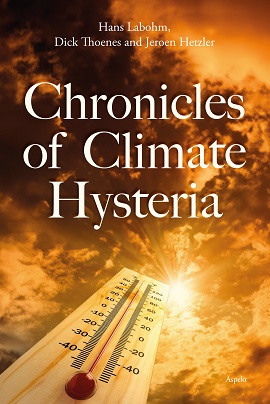Bouwen de werkgroepen 2 en 3 van het IPCC op de fysische resultaten van werkgroep 1 over het broeikaseffect en klimaatverandering? Volgens Sonja Boehmer Christiansen, de editor van Energy & Environment ligt de zaak precies andersom.
Werkgroep 3 met haar economische vergroeningsprogramma zou sinds het begin van het IPCC maatgevend zijn. Werkgroep 1 zou dienen als fysische stok achter de deur om een kostbaar economisch programma te rechtvaardigen.
Christiansen heeft een punt, omdat zij jarenlang als research fellow het IPCC-proces bestudeerde. Wie geen zin in een lange brief heeft, haakt hier af.
Klimaatkemphanen
Het commentaar van Boehmer Christiansen is ontleend aan het blog van Antony Watts. Hier woedt momenteel een stevige discussie nadat mainstream Klimaatwetenschapper Judith Curry een gastposting plaatste, met handreiking naar klimaatcritici.
Maar de kern van haar boodschap is vergelijkbaar met de ‘open brief’ die 55 wetenschappers stuurden, waarover Arthur Rorsch op dit blog al schreef. Klimaatwetenschappers moeten ‘beter communiceren’.
Willis Esschenbach vervolgens levert een vlammend weerwoord op Curry.
Zijn hoofdcommentaar is dat de nog jonge klimaatwetenschap een fundamenteler probleem heeft dan haperende marketing.
Donkergrijze scenario’s
Lees hier de reactie van Boehmer Cristiansen, met dank aan één van onze reageerders die er op wees. Zij stelt dat bij veel milieuwetenschap een politiek programma maatgevend was, en niet andersom. Met name de invloedrijke SRES-emissiescenario’s speelden een te grote rol bij het maken van IPCC-voorspellingen van klimaatimpact. Overigens kwam een kwart van de 45 SRES-auteurs van Nederlandse instituten als het RIVM en ECN. Daarnaast schreven ook Greenpeace, Teri en het Environmental Defense Fund mee aan deze scenario’s.
No mention has been made of the simple fact that international research lobbies (and their supporters in governments, NGOs and at the UN) have become a powerful political actors in the ‘climate game’. Individuals like Judith are bit a small part in a large machine they may not even see. Environmental, energy and climate research lobbies (and their funders the regulators) have come to increasingly rely on environmental threats to attract attention and money.
Also often forgotten is that such threats appeal most o governments when linked to profitable ’solutions’. This is indeed the case for the IPCC.
The solutions were worked out by its working group 3 (WG III) predate the work of IPCC working group 1 on science and climate modelling. The offerred solutions, or responses as they are offically called, range from ‘clean’ technology and the resurrected nuclear power, to environmental taxation and emission standard setting and ‘carbon’ trading. The same solutions were offered, initally, in the 1970s. All these solution relate to the decarbonisation of energy supply. The required investments are huge. They were and still are sought globally with the support of the IPCC? Why?
During the mid-1990 when I studied the politics of the IPCC and especially its science advisory role under a three year ESRC grant , the advocacy role of the IPCC for these ’solutions’ became apparent. This role resulted from three factors that are not usually taken into account by ‘pure’ scientists.
First, the mentioned role of WG 3 on ‘responses’ is usually not included in the discussion of the IPCC. Howevr, it was WG 3 which from the very start supplied the science people with extremely ample emission scenarios. E&E has revealed the errors in these scenarios; here is it sufficent to point out that it is they produce the most scary ‘predictions’ of future warming and hence the justification for interventions into energy markets. WG3 consists of government people, energy technology specialists, emission modellers and environmental economists and was probably the real driving force in the IPCC process.
In contrast, the task of WG 1, was largely supportive: to demonstrate a threat large enough to justify major regulatory and technological efforts related to the low carbon economy so fervently desired by so many. This was an ambition that first arose during the limits to growth scare, was supported by the ‘oil crises’ of the 1970s and became a financial necessity when oil prices fell sharply in the late 1980s, just when the IPCC was set up. The rejection of nuclear power by so many also encouraged the search for a problem that would ‘green’ this low carbon source.
Second, scientists tend to ignore the links between the IPCC and the UN Framework Convention on Climate Change (1992) and its Kyoto Protocol 1987), for these legal promises go a long way towards explaining the pressures on science to ‘deliver’ the policy justification for the desired solutions.This treaty already states in international law, that global warming is man-made and dangerous. Climate remains undefined. The IPCC as advisory body was expected by its Bureau and supportive governments and NGOs, to ‘underpin’ the convention. The Climate treaty remains primarily an attack on carbon fuels.
The interests supporting the decarbonisation agenda have grown much stronger since and have accept ‘alarmist’ predictions of dnagerous ,man-made warming on trust. By now they are, probaly, quite capable of keeping the show on the road, largely at the tax payer expense. Just listen to people like Siemens, the windfarm lobby, WWF, investment banks and many others,
Worries about unintended consequences of this global effort, including the Copenhagen debacle, show that the world recession may not be strong enough to prevent futher attemps at implementing this alleged third industrial revolution. Science and engineering lobbies, as well as regulators, have much to gain. If climate change fails as justification, other threats may have to be used. Ocean acidification and peak oil spring to mind.
Third, and as already hinted at, any analysis of the ‘pure’ science debate neglects important links between the IPCC advisory role and energy sector interests and ambitions. When the oil prices collapsed in the late 1980s, there were many vested interests and even more R&D ambitions that supported state intervention in favour of renewables, nuclear power, energy efficiency, and natural gas. Worries about unintended consequences and the world recession may now threaten this agenda.
To explain my analysis a little more and point out its relevance here:
I studied the IPCC as a senior research fellow from inside the energy policy research community at the Science and Technology Policy Unit (SPRU), University of Sussex.
In my analysis the climate treaty and subsequent negotiations were not primarily science based (though much good science was funded on the way), but involved major efforts to develop and promote low carbon fuels. The motives for this effort can be debated. Many people believed and still believe that ‘saving the planet’ from dangerous warming is the primary objective.
Such a threat is indeed needed as long as hydrocarbons and coal remain very competitive and supportive of rapid economic growth. While regulation and ‘stimulation’ can ensure that carbon has a high enough price to encourage ‘decarbonisation’, the question now is, can we still afford it? The UN and UK governments seem to think so. Were they to change their mind, science may again be needed, but this time to test the veracity of the warming threat.
Having followed the science debates since the late 1980s and would agree with John Christy (made recently in ‘Nature’) that ‘scientists’ ignorance of the climate system is enormous’
I would go for demanding a different public funding system for science and a dissociation of policy-making from science still in the basic research phase, that is attemting to prevent the misuse of science by policy-makers so called. This would include much weaker links between government bodies, for example energy, environment and foreign ministries, and basic climate research bodies like CRU or even the UK Royal Society.
Dr. Sonja Boehmer-Christiansen
Wij toonden al dat veel invloedrijke scenario’s die werkgroep 3 maakte, zijn geschreven door Greenpeace-personeel als William Hare, maar ook Niklas Hohne van Ecofys. Dus laat maar komen die groene economie?






Het is toch al veel langer bekend dat het politici zijn die het rapport schrijven ? Zij schrijven de samenvatting voor beleidsmakers en deze komt uit voordat het wetenschappenlijke rapport afgerond is. Zo kan dit laatste rapport nog even aangepast worden aan de conclusies die in de samenvatting al gemaakt zijn.
Het zijn niet de wetenschappers die alarm slaan, maar de politici die bij het IPCC werken.
Het gaat alleen maar om geld en macht verder is het niets.
Waarom hebben we dit stelletje oplichters van de VN nodig ?
Onderlinge afspraken tussen landen werken toch ook ? Zou de wereld een heleboel geld schelen en kunnen we echt problemen gaan oplossen zonder dit geldverslindende gezwel!
Gr A
Mmm, tja. Dus als ik het goed begrijp willen ze dat wetenschap gefinancieerd wordt door bedrijven? Als het niet door de overheid is, door wie dan? Bedrijven zijn over het algemeen weinig geinteresseerd in fundamenteel onderzoek, en bovendien is het bij bedrijven nog veel sterker zo dan bij de overheid dat het wenselijk is dat een wetenschapper aantoont wat een bedrijf wil zien.
Anders stop je er tenslotte geen geld in.
Het probleem hier is dat de conclusie al vast staat voordat er onderzoek verricht is. De onderzoekers moeten naar een bevestiging zoeken om geld te krijgen als zij met tegengeluiden komen worden ze genergeerd en worden de subsidies gestopt aan deze onderzoekers. Dat is wat het probleem is in deze dicipline.
Het moet zo zijn dat wetenschappers onderzoeken wat er pro en contra is en dat in de openbaarheid brengen zodat iedereen zich hier een beeld bij kan vormen en niet maar 1 partij met een eigen agenda.
Gr A
" en bovendien is het bij bedrijven nog veel sterker zo dan bij de overheid dat het wenselijk is dat een wetenschapper aantoont wat een bedrijf wil zien.
"
Blijkbaar is er geen sprake meer van omkering maar van "een gelijke insteek": de overheid/ambtenarij misbruikt wetenschap niet om geld te verdienen zoals het bedrijfsleven, maar om een door haar gewenste politiek te voeren, die betaald wordt door de burgers, zonder dat die burgers de werkelijke achtergrond kennen.
En het stuitende is dat de media ingezet worden, niet om de waarheid te achterhalen, maar om dat gewenste beleid te verdedigen,met drogredenen.
Om wanhopig van te worden.
Orwell vrijwillig in huis gehaald !
Dit vraagt eigenlijk om een burgerinitiatief: de politiek dwingen verantwoording af te leggen voor door haar gevoerd milieubeleid.
40.000 handtekeningen vraagt dat.
Wie wil dat organiseren ?
Hebben we in Nederland de mogelijkheid om deze mensen voor het gerecht te dagen wegens fraude en oplichting met belastinggeld ?
Dat gaat in Amerika wel gebeuren. Op die manier moeten deze mensen onder eede verklaringen afleggen of meineed plegen.
Op deze manier is een minder mooie maar wel effectievere manier om de waarheid boven water te krijgen.
Gr A
De SRES scenarios leggen op wat de de klimaatmodellen moeten uitrekenen. Door een termijn van 100 jaar te nemen en geen waarschijnlijkheid aan de mogelijke scenarios te koppelen is de teneur vanaf het begin gezet.
Zo schrijft bijvoorbeeld het "hete" scenario A2 een bevolkingsaantal van 15 miljard voor in 2100.
Zie ook Richard Tol et al in 2005 A critical assessment of the IPCC SRES scenarios
http://www.uni-hamburg.de/Wiss/FB/15/Sustainabili…
Dat gedoe over bevolkings aanwas, daar word ik ook gek van.
Laatst berekend: wanneer je de bevolking(sdichtheid) van indonesie extrapoleert naar de landmassa op aarde, dan kom je aan een bevolking van 60 miljard plus.
Natuurlijk dat vele gebieden ongeschikt zijn voor bewoning, maar wat maken we ons toch druk om bevolkingsgroei naar 10 miljard? Komt de welvaart, dan komt ook de geboortebeperking.
En dan hebben we aardig wat speelruimte tussen 10 en 60 miljard.